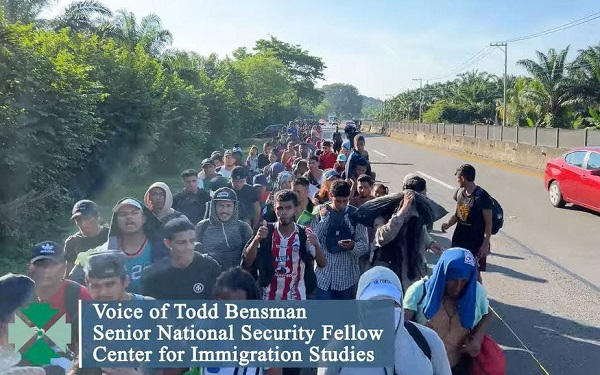illegal immigration
Over 150,000 migrants marching in Mexico, await the outcome of the US Election

From The Center for Immigration Studies
By Todd Bensman
Washington, D.C. (October 24, 2023) – Recent Center for Immigration Studies field work reveals a growing crisis in the Mexican southern state of Chiapas.
Why are thousands of migrants bottled up in this area near the Guatemala-Mexico border, and why are caravans forming but only moving within Chiapas?
On-the-ground reporting by Todd Bensman, the Center’s national security fellow, highlights the impact of the Biden-Harris administration’s December 2023 deal with Mexico and the potential consequences leading up to and following the U.S. election.
|
|
Key findings:
Biden-Harris Agreement: In December 2023, the U.S. and Mexico reached a secretive deal to keep migrants in southern Mexico to reduce the appearance of a border crisis in the U.S. The deal has resulted in the Mexican military setting up roadblocks in the region, particularly around the border town of Tapachula, to slow the flow of migrants.
Migrants Bottled Up: Bensman visited Tapachula, where an estimated 150,000 migrants are stranded, with 500 to 1,500 more arriving daily. The city is overwhelmed, with high poverty levels and unrest.
Caravans and Military Escorts: Migrant caravans are forming, but they are not headed to the U.S. Instead, the Mexican military is escorting them to other cities within Chiapas to ease pressure on Tapachula. Bribes and mafias enable wealthier migrants to escape the blockade, but poorer migrants remain trapped.
CBP One App: The U.S. extended access to the CBP One app, previously only usable in northern Mexico, to allow migrants in southern Mexico to schedule appointments for processing into the U.S. However, delays and limited access make it difficult for most to advance quickly.
Upcoming Election Tension: Many migrants feel an urgency to reach the U.S. before a potential change in leadership. Those interviewed fear that a Trump win would mean a closed border and no benefits, while they believe a Harris win would maintain the status quo and provide access to benefits.
illegal immigration
While Trump has southern border secure, hundreds of thousands of illegal immigrants still flooding in from Canada

From The Center Square
By
Under the Biden administration, the greatest number of illegal border crossers at the U.S.-Canada border were reported in U.S. history, breaking records nearly every month for four years, The Center Square first reported.
While record high numbers dropped under the Trump administration, illegal entries still remain high in northern border states, with some states reporting more apprehensions in 2025 than during the Biden years.
Fourteen U.S. states share the longest international border in the world with Canada, totaling 5,525 miles across land and water.
The majority of illegal border crossers were apprehended and encountered in five northern border states, according to U.S. Customs and Border Protection data analyzed by The Center Square. Nearly half were reported in New York. Washington, Vermont, Maine and Montana recorded the next greatest numbers.
The majority of northern border states reported the greatest number of illegal entries in U.S. history in 2024, the last year of the Biden administration, according to CBP data. At the height of the border crisis, illegal entries reached nearly 200,000 at the northern border in 2024 and in 2023, first reported by The Center Square.
For fiscal years 2022 through 2025, 754,928 illegal border crossers were reported in 14 northern border states, according to the latest available CBP data.
From west to east, illegal entries at the northern border totaled:
-
Alaska: 7,380
-
Washington: 135,116
-
Idaho: 620
-
Montana: 32,036
-
North Dakota: 14,818
-
Minnesota: 8,315
-
Wisconsin: 118
-
Michigan: 50,321
-
Ohio: 1,546
-
Pennsylvania: 19,145
-
New York: 363,910
-
Vermont: 61,790
-
New Hampshire: 82
-
Maine: 59,731
Notably, Alaska, Idaho, New York, Pennsylvania and Wisconsin reported record high illegal crossings in 2023. Although Montana and North Dakota saw a drop in 2025 from record highs in 2024, the number of illegal border crossers apprehended in the two states in 2025 were greater than they were in 2022; in Montana they were more than double.
The data only includes nine months of the Trump administration. The CBP fiscal year goes from Oct. 1 through Sept. 30. Biden administration data includes the first three months of fiscal 2025, nine months of fiscal 2021, and all of fiscal years 2022, 2023 and 2024. Combined, illegal northern border crosser apprehensions totaled roughly one million under the Biden administration, according to CBP data.
The data excludes “gotaways,” the official term used by CBP to describe foreign nationals who illegally enter between ports of entry to evade capture, don’t make immigration claims and don’t return to their country of origin. CBP does not publicly report gotaway data. The Center Square exclusively obtained it from Border Patrol agents. More than two million gotaways were identified by Border Patrol agents under the Biden administration, although the figure is expected to be much higher, The Center Square first reported.
For decades, the northern border has been largely unmanned and unprotected with increased threats of terrorism and lack of operational control, The Center Square reported.
Unlike the 1,954-mile U.S.-Mexico border, there is no border wall, significantly less technological equipment exists and far fewer agents are stationed there.
Officials have explained that the data represents a fraction of illegal border crossers – it remains unclear how many really came through largely remote areas where one Border Patrol agent may be responsible for patrolling several hundred miles, The Center Square has reported.
Despite being understaffed and having far less resources, Border Patrol and CBP agents at the U.S.-Canada border apprehended the greatest number of known or suspected terrorists (KSTs) in U.S. history during the Biden administration – 1,216, or 64% of the KSTs apprehended nationwide, The Center Square exclusively reported.
In February, President Donald Trump for the first time in U.S. history declared a national emergency at the northern border, also ordering the U.S. military to implement border security measures there. After shutting down illegal entries at the southwest border, the administration acknowledged the majority of fentanyl and KSTs were coming through the northern border, The Center Square reported.
The Trump administration has also prioritized increased funding, recruitment and hiring and investment in technological capabilities at the northern border.
Daily Caller
Tom Homan Predicts Deportation Of Most Third World Migrants Over Risks From Screening Docs


From the Daily Caller News Foundation
White House border czar Tom Homan predicted Sunday the Trump administration will deport the majority of Third World migrants due to vetting challenges.
Two National Guardsmen were shot Wednesday, allegedly by an Afghan national brought into the U.S. under the Biden administration. The attack prompted President Donald Trump to announce in a Thursday post on Truth Social that his administration would “permanently pause migration from all Third World Countries.” Homan said on Fox News’s “Sunday Morning Futures” that Third World nations could not be relied upon to provide accurate information for vetting migrants.
Dear Readers:
As a nonprofit, we are dependent on the generosity of our readers.
Please consider making a small donation of any amount here.
Thank you!
“[T]hese Third World nations, they don’t have systems like we do. So, a lot of these Afghanistans, when they did get here and get vetted, they had no identification at all. Not a single travel document, not one piece of identification,” Homan said. “And we’re going to count on the people that run Afghanistan, the Taliban, to provide us any information [on] who the bad guys were or who the good guys are? Certainly not. And many people need to understand that most terrorists in this world, most of ’em, aren’t in any database.”
“And the same thing with illegal aliens, the over 10 million that came across the border under Joe Biden. There’s no way to vet these people. You think El Salvador or Turkey or Sudan or any of these countries have the databases or system checks that we have?” he added. “Do you think the government[s] of China, Russia, Turkey, do you think they’re going to share that data with us even if they did have it? There’s no way to clearly vet these people 100% that they’re safe to come to this country from these Third World nations.”
The president also wrote in his Thursday post he would “terminate all of the millions of Biden illegal admissions,” along with deporting those who do not offer value to the United States. Homan said Trump is correct to evaluate all migrants who entered under Biden.
“I really, truly think that most of ’em are [going to] end up being deported ’cause we’re not going to be able to properly vet them,” he said.
Similarly, Homeland Security Secretary Kristi Noem asserted Sunday on NBC News’s “Meet the Press” the Trump administration would deport individuals with pending asylum claims.
West Virginia Army National Guard Specialist Sarah Beckstrom, 20, perished Thursday from wounds sustained in Wednesday’s shooting. The other victim, Air Force Staff Sgt. Andrew Wolfe, remains in critical condition at the time of publication.
The shooting was allegedly carried out by Rahmanullah Lakanwal, who entered the country in September 2021 after the U.S. military’s withdrawal from Afghanistan. Lakanwal previously worked with the U.S. government, including the CIA, and was admitted into the U.S. under the Biden administration’s Operation Allies Welcome, which resettled Afghans who had helped American forces.
Lakanwal applied for asylum in 2024, which the Trump administration granted in April 2025, according to Reuters. The alleged gunman shouted, “Allahu akbar!” before opening fire with a revolver, independent journalist Julio Rojas reported.
As of December 2024, over 180,000 Afghans were resettled in the U.S. following its August 2021 withdrawal, according to the State Department. After the shooting, the U.S. Citizenship and Immigration Services (USCIS) announced that the “processing of all immigration requests relating to Afghan nationals” would be paused “indefinitely.”
USCIS also asserted Thursday it would conduct a full-scale reexamination of all green cards granted to individuals from 19 countries “of concern” at Trump’s direction. The agency added in a later statement that, when vetting migrants from those nations, it would weigh “negative, country specific factors,” such as whether the country was able to “issue secure identity documents.”
-

 Business2 days ago
Business2 days agoCanada’s climate agenda hit business hard but barely cut emissions
-

 Health2 days ago
Health2 days agoNews RFK Jr.’s vaccine committee to vote on ending Hepatitis B shot recommendation for newborns
-

 International1 day ago
International1 day agoFBI may have finally nabbed the Jan. 6 pipe bomber
-

 Bruce Dowbiggin1 day ago
Bruce Dowbiggin1 day agoIntegration Or Indignation: Whose Strategy Worked Best Against Trump?
-

 espionage1 day ago
espionage1 day agoDigital messages reportedly allege Chinese police targeted dissident who died suspiciously near Vancouver
-

 MAiD1 day ago
MAiD1 day ago101-year-old woman chooses assisted suicide — press treats her death as a social good
-

 Business1 day ago
Business1 day agoCarney’s Toronto cabinet meetings cost $530,000
-

 Health2 days ago
Health2 days ago23,000+ Canadians died waiting for health care in one year as Liberals pushed euthanasia






